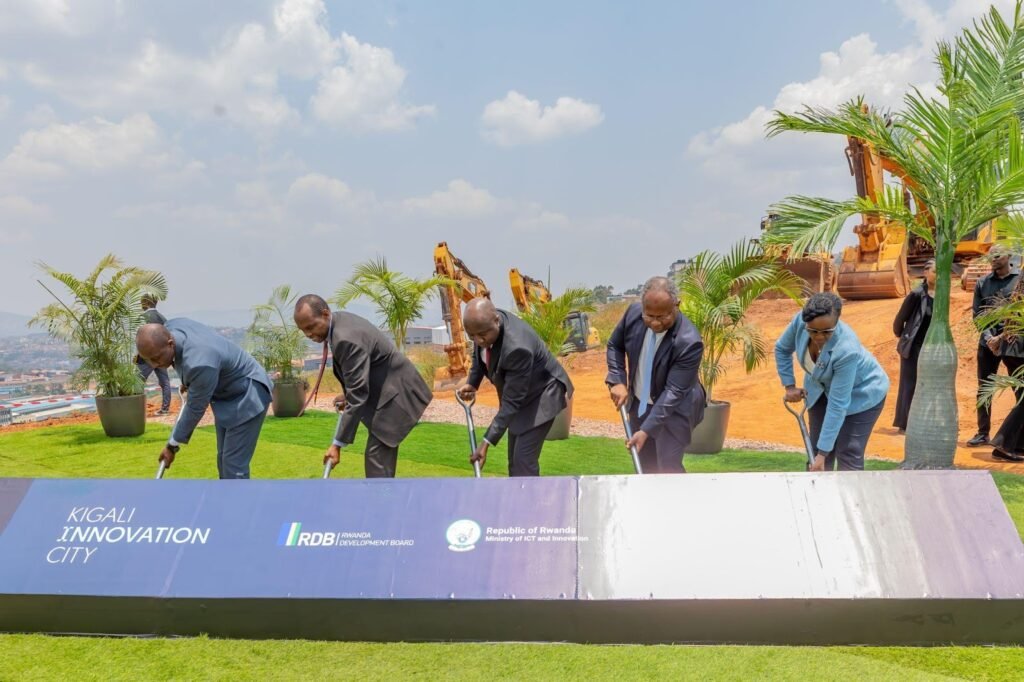Government of Rwanda, Africa50 and the Arab Bank for Economic Development in Africa (BADEA), have broken ground on the construction of Kigali Innovation City (KIC) project, to foster the growth of digital entrepreneurs, businesses, students, and professionals who are relocating to the country, thereby enhancing productivity in industries that are not reliant on natural resources
Dignitaries, policymakers, institutional investors, private investors, multinational corporations, and project developers convened at a ceremony on Tuesday, September 10, to mark the start of construction of the 61-hectare smart city development.
The facility will accommodate top-tier universities, world-class universities, startup incubators, and accelerators across disruptive and data-backed sectors, such as robotics, artificial intelligence, machine learning, and more.
“Critical moment in Rwanda’s journey to becoming a leader in pioneering technology and innovation on the continent,” Édouard Ngirente, Prime Minister of Rwanda, said.
Ngirente added that the ground breaking underscored Africa’s imminent transition from technology consumption to production.
The KIC impact leverages the growth of the digital sector and is projected to reach a value of $2 billion when completed, generate $150 million in ICT exports annually and attract over $300 million in foreign direct investment (FDI). KIC is a testament to digitalisation – an enabler of economic diversification and productivity. The digital sector has been the fastest growing sector in Sub-Saharan Africa (SSA), including South Africa, Kenya and Nigeria, where the digital sector has overtaken the manufacturing sector’s contribution to GDP.
“This project reflects a collective ambition of all our people to transform our country so that innovation, education, and technology can truly become a cornerstone for Rwanda’s future,” Francis Gatare, CEO of Rwanda Development Board, said.
The groundbreaking ceremony included a fireside chat entitled, ‘Catalyzing Innovation: Building a pan-African technology hub’.
According to Alain Ebobissé, CEO of Africa50, the sponsor and developer of KIC, the project aligns with Rwanda’s vision and its progressive policies, which provide businesses and entrepreneurs with certainty and incentives. “The long-term vision and effective implementation de-risks this investment, increases KIC’s ability to attract private investment to the country… and helps universities produce outstanding talent and new technologies that will change the world,” Ebobissé, CEO.
Panellist and tenant of KIC, Dr. Conrad Tucker, Director of Carnegie Mellon University-Africa and Associate Dean for International Affairs Africa, Carnegie Mellon University, underscored the project’s ambition to provide the fertile ground to develop large technology companies, “KIC will develop Africa’s first trillion-dollar business.”
Paula Ingabire, Rwanda’s Minister for ICT and Innovation, advocated for developing products and industries at KIC that will be deployed worldwide, cementing Rwanda and Africa’s position as enabling environments that stimulate trade and contribute to a thriving global digital economy.
KIC, a public-private partnership (PPP) with Africa50 and Rwanda Development Board as sponsors and shareholders; and BADEA as lender, reflects the collaboration of international and local partners taking action to close Africa’s digital divide and accelerate the continent’s digitalization.
Ibrahima Cheikh Diong, Special Representative of the President at BADEA on Environmental, Social and Governance (ESG), a financier to the project, commented on increased South-South cooperation and the bank’s role mobilising international capital for the project: “At BADEA, we are fully prepared to leverage our convening power, track record and network to help promote the cutting edge KIC project in the Arab world and beyond to make sure private investors and other public Gulf-based financial institutions join in with the funding and investment needed to build on the project’s success”.


